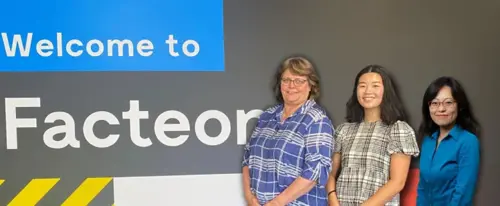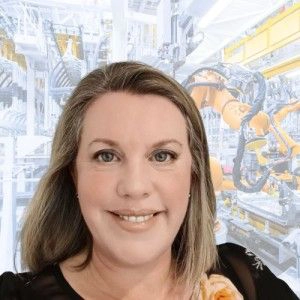Profiles: Women in Engineering
The inspiration for engineering
As noted in a previous article, role models, especially other women, have inspired some of Facteon’s female engineers to take up the profession. Whether they were in the family—as in the case of Senior Procurement Specialist Vicky Pratt, both of whose parents worked in engineering—or at university open days, role models had an influence.
“Coming out of high school I had no idea what I wanted to do. But I loved a good challenge, and nothing is more rewarding to me than knowing I’ve made a positive impact on other people’s lives, so engineering it was,” says Debbie Peng, a Junior Automation Engineer at Facteon who studied at the University of Auckland.
Challenges and rewards
Only six months after starting full-time as an engineer, Debbie worked on a commissioning project in the United States.
“I learnt very quickly that commissioning is a completely different world to working in the office. It’s a high-stress environment where so many things can go awry. This experience emphasized the importance of being a team player and going into each day with the right attitude. This project also felt the most rewarding. There’s nothing quite like seeing the line you worked on come to life and witnessing an entire symphony of robots working together.”
Concept Engineering Team Leader Dr Yan Jia was attracted to an industry where she could “make a difference” and recalls her first job as a field service engineer on oil rigs in the Norwegian Sea.
"After graduation, my first job was in the oil and gas industry. For the first two years, I was stationed in Stavanger, Norway. Working offshore was extremely challenging both physically and mentally. At the time, I was the only female engineer, and the only engineer of Asian descent, working on the oil rig. After that, I transferred to the company’s research facility in Singapore, where I could apply my field knowledge to product development.”
For Sarita Withers, a Project Manager at Facteon, the most testing and interesting environment to date has been the creation of new automated equipment—taking a project from concept to full production, while making continuous improvements along the way.

Skills for success
Sarita points out that in a rapidly changing technological environment, agility is a must. “So is patience. A patient mindset improves communication and creativity; it also builds better relationships and collaboration in the office and reduces stress. Being passionate about your work is also essential for a meaningful and successful career.”
“You need to be able to work with others, remain focused, and believe that with the right team, anything is possible. Being multiskilled and communicating positively are ways in which any engineer can continually improve,” adds Vicky Pratt.
All four agree that a successful engineering career takes a mix of technical and soft skills, such as analytical thinking, problem solving, communication, and working as a team.
Company and industry support
While they have all experienced gender bias in their careers, none of them believes it has impacted their personal success, largely because of who they are and what they bring to their role: self-belief, desire, and ability.
Yan extends her networks through the Institute of Electrical and Electronic Engineers’ (IEEE) Robotics and Automation Society, which has a Women in Engineering group. She says companies can do more to prioritize diversity in their recruiting process and offer flexible work arrangements.
Sarita would like to see a stronger culture of inclusion and support for women through leadership and mentoring programs. Debbie agrees: “While there are great initiatives within the university environments, I think we definitely need more within industry to support our women in engineering.”
Vicky would begin supporting gender equality even earlier. “I believe this comes back to parents and schools to ensure young people know they can do whatever they want. There are no longer ‘traditional’ occupations for people and this should be better understood and embraced.”
Find out more
If you’d like to speak with one of our female engineers about work in the industry and working at Facteon, contact Human Resources at HR@facteon.global.

Kate Watson
Kate leads Facteon’s HR function, which includes looking after our people based in New Zealand, the USA, and Mexico.
With a background in law, Kate is a highly experienced HR professional with experience across the public and private sector. Kate is a trusted business advisor committed to building positive, high-performing work cultures.

